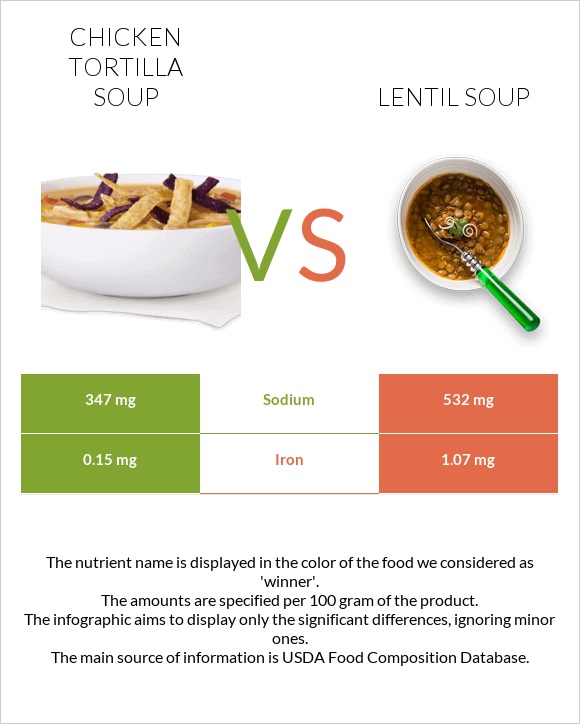Chicken tortilla soup vs. Lentil soup — In-Depth Nutrition Comparison
Compare
Significant differences between chicken tortilla soup and lentil soup
- The amount of iron in lentil soup is higher than in chicken tortilla soup.
- Lentil soup covers your daily iron needs 12% more than chicken tortilla soup.
Specific food types used in this comparison are CAMPBELL'S Homestyle Mexican Style Chicken Tortilla Soup and Soup, lentil with ham, canned, ready-to-serve.
Infographic

Infographic link
Mineral Comparison
Mineral comparison score is based on the number of minerals by which one or the other food is richer. The "coverage" charts below show how much of the daily needs can be covered by 300 grams of the food.
| Contains less SodiumSodium | -34.8% |
| Contains more CalciumCalcium | +112.5% |
| Contains more IronIron | +613.3% |
Vitamin Comparison
Vitamin comparison score is based on the number of vitamins by which one or the other food is richer. The "coverage" charts below show how much of the daily needs can be covered by 300 grams of the food.
| Contains more Vitamin CVitamin C | +∞% |
All nutrients comparison - raw data values
| Nutrient |  |
 |
DV% diff. |
| Iron | 0.15mg | 1.07mg | 12% |
| Phosphorus | 74mg | 11% | |
| Copper | 0.07mg | 8% | |
| Sodium | 347mg | 532mg | 8% |
| Vitamin B6 | 0.09mg | 7% | |
| Vitamin B1 | 0.07mg | 6% | |
| Fiber | 1.2g | 5% | |
| Manganese | 0.12mg | 5% | |
| Vitamin B12 | 0.12µg | 5% | |
| Folate | 20µg | 5% | |
| Potassium | 144mg | 4% | |
| Zinc | 0.3mg | 3% | |
| Vitamin B2 | 0.045mg | 3% | |
| Vitamin B3 | 0.545mg | 3% | |
| Vitamin B5 | 0.14mg | 3% | |
| Protein | 2.86g | 3.74g | 2% |
| Vitamin C | 0mg | 1.7mg | 2% |
| Magnesium | 9mg | 2% | |
| Calcium | 8mg | 17mg | 1% |
| Vitamin A | 7µg | 1% | |
| Selenium | 0.3µg | 1% | |
| Monounsaturated fat | 0.52g | 1% | |
| Polyunsaturated fat | 0.13g | 1% | |
| Calories | 53kcal | 56kcal | 0% |
| Fats | 0.82g | 1.12g | 0% |
| Net carbs | 6.96g | 8.16g | N/A |
| Carbs | 8.16g | 8.16g | 0% |
| Cholesterol | 4mg | 3mg | 0% |
| Sugar | 1.63g | N/A | |
| Saturated fat | 0.408g | 0.45g | 0% |
Macronutrient Comparison
Macronutrient breakdown side-by-side comparison
Protein:
2.86 g
Fats:
0.82 g
Carbs:
8.16 g
Water:
86.4 g
Other:
1.76 g
Protein:
3.74 g
Fats:
1.12 g
Carbs:
8.16 g
Water:
85.75 g
Other:
1.23 g
| Contains more OtherOther | +43.1% |
| Contains more ProteinProtein | +30.8% |
| Contains more FatsFats | +36.6% |
~equal in
Carbs
~8.16g
~equal in
Water
~85.75g
Fat Type Comparison
Fat type breakdown side-by-side comparison
Saturated fat:
Sat. Fat
0.408 g
Monounsaturated fat:
Mono. Fat
0 g
Polyunsaturated fat:
Poly. Fat
0 g
Saturated fat:
Sat. Fat
0.45 g
Monounsaturated fat:
Mono. Fat
0.52 g
Polyunsaturated fat:
Poly. Fat
0.13 g
| Contains less Sat. FatSaturated fat | -9.3% |





